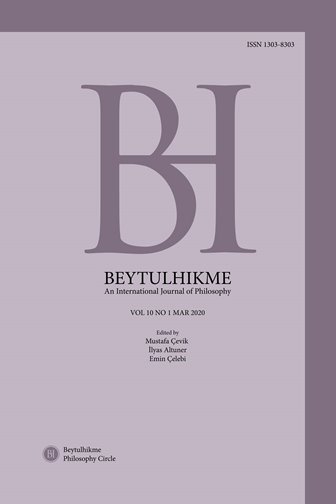Author :
Abstract
Failin toplumla ilişkisi, sosyal bilimlerde klasik bir sorundur. Literatür, çoğunlukla ve uzun zamandır iki ana metodolojik pozisyonun, metodolojik bireyciliğin ve metodolojik holizmin hakimiyeti altındadır. Bunlar sırasıyla bireyleri ve kolektiviteleri toplumun kurucu parçaları olarak görürler. İlki, toplumsal gerçekliğin atomistik, tarih ve toplumsallık dışı bir anlayışından muzdaripken, ikincisi, kişiyi toplumsal nesnede eritme eğilimindedir ve onu şeyleşmiş bir varlık olarak görür. Bu çalışma, Roy Bhaskar’ın düşüncesindeki toplum ve kişi bağlantısı kavramsallaştırmasını anahtar metinleriyle incelemeyi amaçlamaktadır. Çalışma, metodolojik bireycilik ve metodolojik holizmin aksine toplumun ilişkilerden oluştuğunu savunmaktadır. Ayrıca, toplumun varlığı insana önceldir, fakat var kalabilmesi için insan praksisine bağımlıdır ve bu ikisi arasında ontolojik bir boşluk vardır. Böylesi bir çözümlemenin siyaset bilimi ve siyaset sosyolojisi açısından önemli içerimleri vardır. Metodolojik bireycilik liberalizm, faydacılık ve neo-klasik ekonominin temelini oluştururken, metodolojik holizm milliyetçiliği, faşizmi ve Stalinizmi payandalamaktadır. Kişi ve toplumun kendine özgü ontolojilerini tanıyan metodolojik ilişkiselcilik ise mevcut sosyo-politik yapıların dönüşümüne ve siyasetin demokratikleştirilmesine zemin hazırlayabilir.
Keywords
Abstract
How the agency relates to society is a classic problem in the social sciences. The literature, for the most part, has long been dominated by two main methodological positions, namely methodological individualism, and methodological holism. These consider individuals and collectivities respectively as constituent parts of society. While the former suffers from an atomistic, a-historical and a-social conception of social reality, the latter tends to dissolve the person into the social object and considers it as reified. The present study explores Roy Bhaskar’s conception of the connection between society and person connection through his key texts. The study argues that contrary to methodological individualism and methodological holism, society is composed of relations. Furthermore, although society pre-exists the person, its survival depends upon human praxis, creating an ontological gap between them. Such an analysis has important implications for political science and political sociology. Methodological individualism underpins liberalism, utilitarianism and the neo-classical economy, methodological holism underpins nationalism, fascism, and Stalinism. In contrast, methodological relationism acknowledges both the distinctive ontologies of the person and society, which could enable the transformation of existing socio-political structures and the democratization of politics.
Keywords
- Berger, P. & Pullberg, S. (1965). Reification and the Sociological Critique of Con- sciousness. History and Theory, 4 (2), 196-211.
- Bhaskar, R. (1998). The Possibility of Naturalism: A Philosophical Critique of the Con- temporary Human Sciences (Critical Realism-Interventions). New York: Routledge.
- Bhaskar, R. (2008). A Realist Theory of Science. New York: Routledge.
- Bhaskar, R. (2011). Reclaiming Reality: A Critical Introduction to Contemporary Philos- ophy. New York: Routledge.
- Collier, A. (1994). Critical Realism: An Introduction to the Philosophy of Roy Bhaskar. London: Verso.
- Jessop, B. (2005). Critical Realism and the Strategic-Relational Approach. New Formations: A Journal of Culture, Theory and Politics, 56, 40-53.
- Keat, R. & Urry, J. (1975). Social Theory as Science. London: Routledge.
- Marx, K. (1972). The Eighteenth Brumaire of Louis Bonaparte. Moscow: Progress Publishers.
- Marx, K. (1990). Capital 1: A Critique of Political Economy. (Trans. B. Fowkes). London & New York: Penguin Classics.
- Marx, K. (1993). Grundrisse: Foundations of the Critique of Political Economy. (Trans. M. Nicolaus). London: Penguin Books.
- Sayer, A. (1992). Method in Social Science: A Realist Approach. London: Routledge. Öz: Failin toplumla ilişkisi, sosyal bilimlerde klasik bir sorundur. Literatür, çoğunlukla ve uzun zamandır iki ana metodolojik pozisyonun, metodolojik bireyciliğin ve metodolojik holizmin hakimiyeti altındadır. Bunlar sırasıyla bireyleri ve kolektiviteleri toplumun kurucu parçaları olarak görürler. İlki, toplumsal gerçekliğin atomistik, tarih ve toplumsallık dışı bir anlayışından muzdaripken, ikincisi, kişiyi toplumsal nesnede eritme eğilimindedir ve onu şeyleşmiş bir varlık olarak görür. Bu çalışma, Roy Bhaskar’ın düşüncesindeki toplum ve kişi bağlantısı kavramsallaştırmasını anahtar metinleriyle incelemeyi amaçlamaktadır. Çalışma, metodolojik bireycilik ve metodolojik holizmin aksine toplumun ilişkilerden oluştuğunu savunmaktadır. Ayrıca, toplumun varlığı insana önceldir, fakat var kalabilmesi için insan praksisine bağımlıdır ve bu ikisi arasında ontolojik bir boşluk vardır. Böylesi bir çözümlemenin siyaset bilimi ve siyaset sosyolojisi açısından önemli içerimleri vardır. Metodolojik bireycilik liberalizm, faydacılık ve neo-klasik ekonominin temelini oluştururken, metodolojik holizm milliyetçiliği, faşizmi ve Stalinizmi payandalamaktadır. Kişi ve toplumun kendine özgü ontolojilerini tanıyan metodolojik ilişkiselcilik ise mevcut sosyo-politik yapıların dönüşümüne ve siyasetin demokratikleştirilmesine zemin hazırlayabilir. Anahtar Kelimeler: Toplum, kişi, bireycilik, holizm, diyalektizm, ilişkiselcilik, dönüşümsel toplum modeli.





